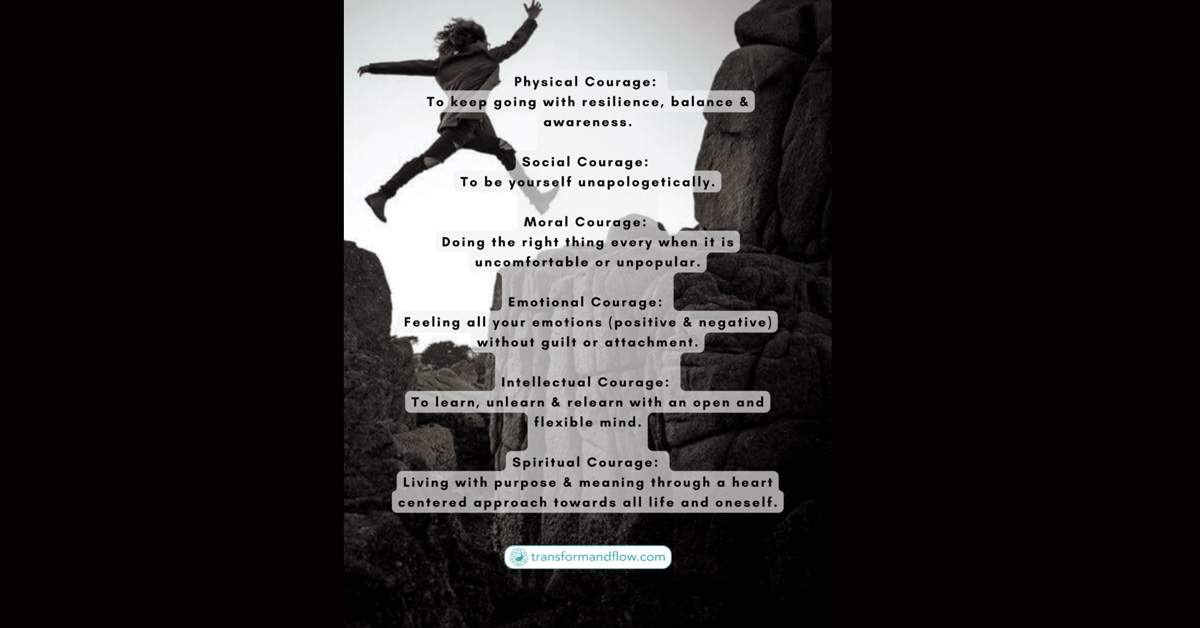Courage is often associated with acts of heroism, but true bravery manifests in many different ways throughout life. It’s not just about facing physical danger—it’s about standing strong in your values, emotions, intellect, and spirit. Understanding the six types of courage can help us cultivate resilience, authenticity, and purpose in our daily lives. Here’s a deeper look into each type, along with resources to help you develop them further.
1. Physical Courage: Keep Going with Resilience, Balance & Awareness
Physical courage is the ability to push through physical challenges, whether in sports, personal fitness, or overcoming an illness. It’s about resilience, maintaining balance, and having the awareness to know your limits while striving for more. Physical courage isn’t about recklessness; it’s about perseverance and maintaining well-being through difficult times.
To build physical courage, adopt a mindset of progress over perfection. Whether you’re training for a marathon, recovering from an injury, or simply pushing yourself to stay active, consistency is key.
👉 Learn more about resilience and physical well-being: Harvard Health – The Importance of Physical Activity
2. Social Courage: Be Yourself Unapologetically
Social courage is the bravery to be your authentic self, even when facing criticism, judgment, or rejection. It’s the ability to express your thoughts, beliefs, and identity without fear of how others will react. Social courage helps people develop confidence and strong interpersonal relationships.
In a world driven by social media, where comparison can lead to self-doubt, cultivating social courage is more important than ever. By embracing your unique qualities and values, you encourage others to do the same.
👉 For tips on building confidence and authenticity: Psychology Today – The Courage to Be Yourself
3. Moral Courage: Doing the Right Thing Even When It’s Uncomfortable or Unpopular
Moral courage is the strength to stand up for what is right, even when faced with adversity. It involves speaking out against injustice, standing by ethical principles, and making difficult choices that align with your values.
Many historical figures, such as Martin Luther King Jr. and Malala Yousafzai, exemplify moral courage by challenging oppressive systems despite significant risks. Developing moral courage means understanding your values and committing to them, even in the face of opposition.
👉 For insights on ethical leadership and standing up for what’s right: Markkula Center for Applied Ethics
4. Emotional Courage: Feeling All Your Emotions Without Guilt or Attachment
Emotional courage is the ability to experience and express all emotions—both positive and negative—without fear, shame, or guilt. In a culture that often values strength over vulnerability, allowing yourself to fully feel and process emotions requires true bravery.
Brené Brown, a leading researcher on vulnerability, emphasizes that embracing emotions leads to deeper connections, mental clarity, and personal growth. Suppressing emotions only leads to stress and disconnection, whereas embracing them fosters resilience and emotional intelligence.
👉 Learn more about emotional vulnerability and resilience: Brené Brown – The Power of Vulnerability
5. Intellectual Courage: To Learn, Unlearn & Relearn with an Open and Flexible Mind
Intellectual courage is the willingness to challenge existing beliefs, be open to new ideas, and acknowledge when we are wrong. It requires humility, curiosity, and the ability to step outside of our mental comfort zones.
The world is constantly evolving, and intellectual courage helps us adapt by encouraging continuous learning and critical thinking. This type of courage is particularly important in an era of misinformation, where questioning sources and seeking truth is crucial.
👉 For resources on lifelong learning and intellectual curiosity: The Power of Bravery | Sofia Sanchez | TEDxReno
6. Spiritual Courage: Living with Purpose & Meaning Through a Heart-Centered Approach
Spiritual courage is about living with intention, aligning actions with values, and seeking meaning in life. It doesn’t necessarily refer to religious beliefs—it’s about nurturing inner peace, connection, and purpose.
Many spiritual traditions emphasize love, compassion, and mindfulness as pathways to courage. Whether through meditation, nature, or acts of kindness, cultivating spiritual courage can provide a deeper sense of fulfillment.
👉 Explore mindfulness and spiritual courage: Mindful.org – The Power of Mindfulness
Conclusion: Courage is a Daily Practice
Courage is not reserved for grand gestures or heroic acts—it’s something we can practice in everyday life.
Whether it’s standing up for what’s right, embracing emotions, or committing to lifelong learning, each type of courage plays a crucial role in shaping our character and experiences.
By developing physical, social, moral, emotional, intellectual, and spiritual courage, we can lead more authentic, resilient, and purpose-driven lives.
So, which type of courage will you cultivate today?


